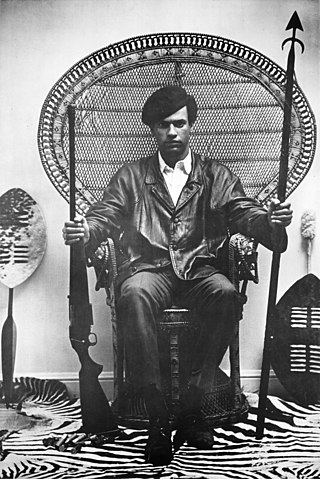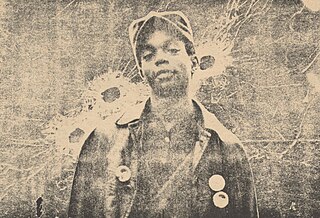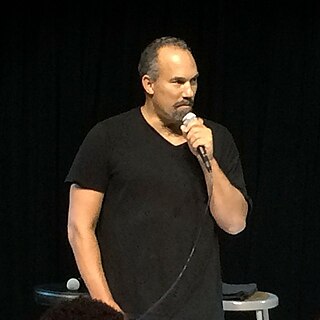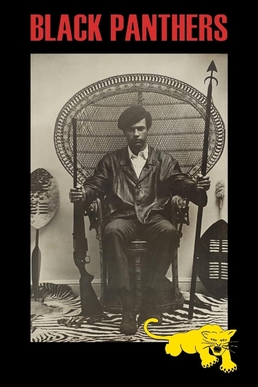
Robert George Seale is an American engineer, political activist and author. Seale is widely known for co-founding the Black Panther Party with fellow activist Huey P. Newton. Founded as the "Black Panther Party for Self-Defense", the Party's main practice was monitoring police activities and challenging police brutality in black communities, first in Oakland, California, and later in cities throughout the United States.

Leroy Eldridge Cleaver was an American writer and political activist who became an early leader of the Black Panther Party.

Huey Percy Newton was an African American revolutionary and political activist who founded the Black Panther Party. He ran the party as its first leader and crafted its ten-point manifesto with Bobby Seale in 1966.

Robert James Hutton, also known as "Lil' Bobby", was the treasurer and first recruit to join the Black Panther Party. Alongside Eldridge Cleaver and other Panthers, he was involved in a confrontation with Oakland police that wounded two officers. Hutton was killed by the police under disputed circumstances. Cleaver stated Hutton was shot while surrendering with his hands up, while police stated he ignored commands and tried to flee.

Merritt College is a public community college in Oakland, California, United States. Merritt, like the other three campuses of the Peralta Community College District, is accredited by the Accrediting Commission for Community and Junior Colleges. The college enrolls approximately 6,000 students.

Alprentice "Bunchy" Carter was an American activist. Carter is credited as a founding member of the Southern California chapter of the Black Panther Party. Carter was shot and killed by a rival group, Ron Karenga's "Us", and is celebrated by his supporters as a martyr in the Black Power movement in the United States. Carter is portrayed by Gaius Charles in the 2015 TV series Aquarius.

Roger Guenveur Smith is an American actor, director, and writer best known for his collaborations with Spike Lee.

David Hilliard is a former member of the Black Panther Party, having served as Chief of Staff. He became a visiting instructor at the University of New Mexico in 2006. He also is the founder of the Dr. Huey P. Newton foundation.

Kathleen Neal Cleaver is an American law professor and activist, known for her involvement with the Black Power movement and the Black Panther Party, a political and revolutionary.

The New Panther Vanguard Movement (NPVM), originally known as the New African American Vanguard Movement (NAAVM) was created in South Central Los Angeles in 1994 as a response to the Los Angeles riots of 1992. Former members of the Black Panther Party and other community activists came together after the riots and shared their frustration with the lack of leadership in the Black community. After various dialogues, they decided to create a grassroots organization that would reflect the vision and community spirit of the Black Panther Party.

Emory Douglas is an American graphic artist. He was a member of the Black Panther Party from 1967 until the Party disbanded in the 1980s. As a revolutionary artist and the Minister of Culture for the Black Panther Party, Douglas created iconography to represent black-American oppression.

The Black Panther Party was a Marxist–Leninist and black power political organization founded by college students Bobby Seale and Huey P. Newton in October 1966 in Oakland, California. The party was active in the United States between 1966 and 1982, with chapters in many major American cities, including San Francisco, New York City, Chicago, Los Angeles, Seattle, and Philadelphia. They were also active in many prisons and had international chapters in the United Kingdom and Algeria. Upon its inception, the party's core practice was its open carry patrols ("copwatching") designed to challenge the excessive force and misconduct of the Oakland Police Department. From 1969 onward, the party created social programs, including the Free Breakfast for Children Programs, education programs, and community health clinics. The Black Panther Party advocated for class struggle, claiming to represent the proletarian vanguard.

Revolutionary Suicide is an autobiography written by Huey P. Newton with assistance from J. Herman Blake originally published in 1973. Newton was a major figure in the American black liberation movement and in the wider 1960s counterculture. He was a co-founder and leader of what was then known as the Black Panther Party (BPP) for Self-Defence with Bobby Seale. The chief ideologue and strategist of the BPP, Newton taught himself how to read during his last year of high school, which led to his enrollment in Merrit College in Oakland in 1966; the same year he formed the BPP. The Party urged members to challenge the status quo with armed patrols of the impoverished streets of Oakland, and to form coalitions with other oppressed groups. The party spread across America and internationally as well, forming coalitions with the Vietnamese, Chinese, and Cubans. This autobiography is an important work that combines political manifesto and political philosophy along with the life story of a young African American revolutionary. The book was not universally well received but has had a lasting influence on the black civil rights movement.

Mark Everett Comfort was a community activist who worked in early Oakland grassroots civil rights movements in the 1960s, before moving to Lowndes County, Alabama.

Ericka Huggins is an American activist, writer, and educator. She is a former leading member of the political organization, Black Panther Party (BPP). She was married to fellow BPP member John Huggins in 1968.

Black Panthers is a 1968 short documentary film directed by Agnès Varda.

The Revolutionary People's Constitutional Convention (RPCC) was a conference organized by the Black Panther Party (BPP) that was held in Philadelphia from September 4–7, 1970. The goal of the Convention was to draft a new version of the United States Constitution and to unify factions of the radical left in the United States. The RPCC represented one of the largest gatherings of radical activists across movements and issues in the United States. The Convention was attended by a variety of organizations from the Black Power Movement, Asian American Movement, Chicano Movement, American Indian Movement, Anti-war movement, Women's Liberation, and Gay Liberation movements. Estimates of attendance range from 6,000 to 15,000. Attendees convened in workshops to draft declarations of demands related to various issues, which were ultimately intended to be incorporated into a new constitution which would function as the final vision of those movements. The RPCC also signified a shift in BPP focus from black self-defense to a broader revolutionary agenda. While conflicts did arise during the Philadelphia Convention, the conference was ultimately deemed a success by the Panthers. After the Philadelphia conference, attempts were made to reconvene to finalize and ratify the new constitution in Washington, DC a few months later but ultimately failed due to police interference and Panther disorganization.
Judy Juanita is an American poet, novelist and playwright. She is a Lecturer in the College Writing Programs at the University of California, Berkeley. She was formerly a writing teacher at Laney College. In 1968, while attending San Francisco State, Juanita served as editor-in-chief of The Black Panther, the newspaper of the Black Panther Party. In her semi-autobiographical novel, Virgin Soul,, a black teen starts community college in Oakland, struggles to matriculate and then joins the Black Panther Party (BPP). The story of the female foot soldier in the black power movement, Virgin Soul exposes the unheralded women working behind-the-scenes in the BPP and the black student movement..

Judas and the Black Messiah is a 2021 American biographical crime drama film directed and produced by Shaka King, who wrote the screenplay with Will Berson, based on a story by the pair and Kenny and Keith Lucas. The film is about the betrayal of Fred Hampton, chairman of the Illinois chapter of the Black Panther Party in the late-1960s Chicago, by William O'Neal, an FBI informant. Jesse Plemons, Dominique Fishback, Ashton Sanders, Darrell Britt-Gibson, Lil Rel Howery, Algee Smith, Dominique Thorne, and Martin Sheen also star.
Intercommunalism is an ideology which was adopted by the Oakland chapter of the Black Panther Party after its turn away from revolutionary nationalism in 1970. Intercommunalists believe that most forms of nationalism are obsolescent, because international corporations and technologically advanced imperialist states have reduced most nations down to a series of discrete communities which exist to supply an imperial center, a situation called reactionary intercommunalism. They also believe this situation can be transformed into revolutionary intercommunalism and eventually communism if communities are able to link "liberated zones" together into a united front against imperialism. According to Huey P. Newton the development of intercommunalism was necessary "because nations have been transformed into communities of the world." Intercommunalism is a lesser-known aspect of the Panthers' legacy as much of its development occurred at the height of the party's suppression and reorientation towards survival programs.


















